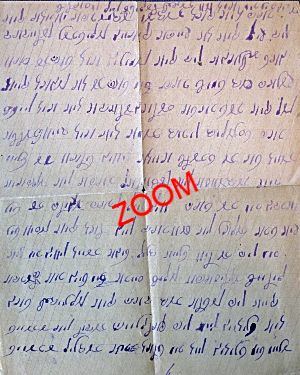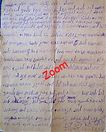Documents of Kaplun family
In 1918, the communist government of the Soviet Russia disenfranchised (stripped of voting rights) several categories of the country's citizens, including those who employed hired laborers and engaged in commerce. See Wikipedia
Around 1927 Khuna Kaplun and his family were among 3 038 739 people disenfranchised. In 1934, they petitioned Krasnostav's election committee to grant them voting rights on the grounds of being dependents of a collective farmer.
Around 1927 Khuna Kaplun and his family were among 3 038 739 people disenfranchised. In 1934, they petitioned Krasnostav's election committee to grant them voting rights on the grounds of being dependents of a collective farmer.
Statement of Khuna Kaplun
|
Translated text (Russian)
Избиркому при Красноставской еврейской общине, от гр.Каплун Хуны и Лии и дочки Бейлы.
Заявление. Просим восстановить нас в избирательных правах. Мы находимся на содержании колхозника, который пользуется избирательными правами Translated text (English)
To the election committee under the Krasnostav Jewish community,
from the citizens Khuna Kaplun, Leah, and their daughter Beyla. Statement. We ask you to restore us in voting rights. We are dependents of a collective farmer member, who has voting privileges. Signature |
Decision of Krasnostav Jewish Election Committee
|
Translated text (Russian)
Выписка из протокола заседания избиркома красноставской еврейской общины от 12.11.1934 г.
Слушали заявление Каплун Хуны и Лии и дочки Бейлы про предоставлению избирательных прав. Постановили: Предоставить избирательные права так как они находятся на содержании колхозника С оригиналом сверено. Секретарь Бараш?. Подпись Translated text (English)
Extract from the minutes of the meeting
of Krasnostav Jewish Election Committee at 12.11.1934. Listened to the statement of Kaplun Khuna, and Leah, and their daughter Beyla about the granting of voting rights. Resolved:To grant electoral rights as they are on the content of the collective farm member. The original is verified. Secretary. Signature. |
Letter from Krasnostav, Ukraine to Lowell, MA (around 1940)
|
Translation from Yiddish to English (page 1)
Dear children, you should all be well, with my dear and beloved grandchildren. About my health, thank God. I have gotten your letter that you are going to send out a package. Shay’lik (? male nickname for Shaya perhaps) was a very good child.
Today he doesn’t want to know of me. I should go barefoot and naked, and it doesn’t bother him. He used to travel to Kiev and he’d bring a Kupka (currency) and a pair of (rain) boots and a sweater. You think he would be so bad. He has a very bad wife. She is like a thorn. You could understand that she is a wagon driver’s daughter. I can tell you that he really embarrassed me that he took her. I am at Baila’s all day. I go home to sleep. When I come, I am like a stranger. Everything is locked up. She doesn’t want to give me even a piece of sugar. Translation from Yiddish to English (page 2)
Here, the sugar is [indecipherable]. Baila drinks, and gives me the last piece. Baila’s little daughter is already walking all winter and talks a little bit already and she’s turning out to be a beautiful girl. And the boy is in Rosovitz (?) and _____ the neighbors are asking and mocking Shay’lik’s wife. They ask her how her life is, and she says ‘I can live a lot better of course. I can afford food every day [indecipherable] over her mother in law. But she will sit and stare into the eyes. As I said, the neighbors give her a piece (of their mind). I have to raise her. She has a sister, and the sister tells me - who needs you here? Get married. I don’t need you. Gittel got married and she also got married, the past Bereishis Siyum. It is pretty good for her. Be well children and my dear grandchildren. Along with Mechutan (son or daughter in law’s father) Mottel’n (nickname for Mordechai usuallyl). They send packages to their parents. And I am a burden on her head.
|






